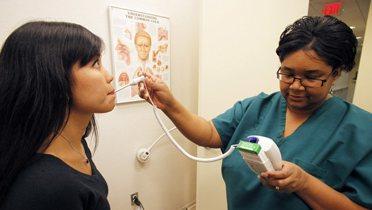One of the central policy debates of the 2020 presidential contest will be health care. Democratic candidates and President Donald Trump have firm, yet divergent positions on a plethora of specific issues related to individuals’ access to health care. However, despite each party having the opportunity to use the issue to their advantage, both parties are running away from popular positions on issues that the American public believes are centrally important to the future.
In a November 2018 Gallup poll, voters were asked “How important will healthcare be to your vote in Congress this year?” Fully 80% said it would be extremely important or very important. This finding is not surprising. Far from the lips of politicians or the teleprompters of cable news shows, Americans engage with the health care sector on a regular basis; through doctor’s visits, hospital stays, caring for aging parents, paying a copay for an x-ray or seeing the premium taken out of their weekly paycheck. Health care composes about one-sixth of the American economy, making the issue omnipresent for almost all Americans.
In a setting where a policy issue is front and center to voters and those voters consider it very important to the electoral choices they make, the party or candidate with ideas that connect with those voters can position herself to be very successful—but both parties have significant liabilities on the issue.
Democrats’ liabilities on health care
There are several aspects of health care that help Democrats, as their positions align with large majorities of the public. According to a 2018 Gallup poll, 57% of Americans believe that the government should be responsible for ensuring all Americans have health care coverage. Similarly, a 2019 CNN poll showed that 56% of Americans believe that the government should provide a national health insurance program for all Americans (even if it meant higher taxes.)
In addition, 2018 polling from the Kaiser Family Foundation (KFF) showed more than 75% of Americans supported Medicaid expansion, closing the Medicare prescription doughnut hole, subsidies for low-income Americans to purchase health care, keeping children on parents’ insurance until age 26, and eliminating out-of-pocket expenses for preventive care—all parts of the Democratic-supported Affordable Care Act (ACA).
However, despite some of these advantages on health care, some Democratic presidential candidates have promoted policies that clash with popular opinion. For example, the same CNN poll showed that while 38% of Americans supported health insurance coverage for undocumented individuals, 59% opposed it. Additionally, while 56% said they supported a national health insurance program, 57% of those supporters said such a plan should not replace private health insurance.
Those CNN findings echo a KFF study from June 2019 which showed that while a majority of Americans supported “Medicare for all” (63%), many were confused about how that policy would be carried out. In fact, the study showed that question wording mattered as well. While 63% supported Medicare for all, only 49% said they supported a single payer health care system. In fact, KFF found that 55% of Americans believe that under a Medicare for all plan, they would still be able to keep their private health insurance. In fact, in a 2019 Hill-HarrisX poll, only a small minority of Americans (13%) supported a system in which existing private health insurance was eliminated.
This uncertainty, and at times, conflicting sets of beliefs among voters about Democratic plans create a situation in which voters need details rather than catch phrases. And while several presidential candidates support the popular Medicare for all, several also support far less popular positions including the elimination of private health insurance and coverage for undocumented individuals. In several cases, those candidates are taking a stand on principle—arguing health care is a human right and coverage should be allowed regardless of one’s station. However, on an issue as important as health care is to all Americans, Democratic candidates will need to move a public that is skeptical on some parts of their plans.
Republicans’ liabilities on health care
In 2010 and again in 2014, the Republican Party was successful in congressional midterms by slamming the ACA or “Obamacare” and promising a full repeal of the law. The party used repeal votes in Congress to connect with a public that strongly disapproved of the law. And in the 2016 presidential campaign between a Democrat who promised to maintain and improve the law and a Republican who promised to repeal the law and replace it with something better, the Republican won.
However, along the way, Republicans faced a serious political problem that came into full view early on in the Trump presidency: the public turned on their health care position. During the Obama administration, support for ACA dropped as low as 33%, according to the KFF poll. However, as the law came under a more serious threat (as a Republican president took office with a unified Republican Congress), Republicans did something President Barack Obama never could. They made Obamacare popular. By early 2018, ACA had majority support where it has largely remained to today.
Americans began to understand that while the label “Affordable Care Act” or “Obamacare” was unpopular, there was much about the law that they like—and more importantly, that they relied on. Public opinion have shifted so dramatically, that when Republicans finally had Congressional majorities and control of the White House, they could not repeal the law. Why? Because the repeal position was highly unpopular among Americans.
However, President Trump has sought to have the law curtailed or repealed via judicial action. In a case before a federal appeals court—Texas v. United States—the validity of the law is in question. And while the Trump administration has taken a variety of positions on the case, one of those positions included the full repeal of the ACA—a position Democrats will use against the president in his pursuit of reelection.
Although the repeal of ACA may be appealing to the president’s base, a full repeal would also immediately remove some of the elements of the law that are popular among many Americans—even Republican base voters. To put into perspective how unpopular the president’s repeal position is, the chart below shows levels of support for nine major provisions of the ACA.
Public support for elements of the ACA (November 2018)
| ACA Provision | Support |
| Coverage for pre-existing Conditions | 65% |
| Medicaid expansion | 77% |
| Closing the Medicare drug doughnut hole | 81% |
| Subsidies for low income Americans’ coverage | 81% |
| Payroll tax increases for the rich | 65% |
| Children staying on parents insurance until 26 | 82% |
| Eliminating out-of-pocket costs for preventive care | 79% |
| ACA exchanges | 82% |
| The employer mandate | 69% |
Ultimately, the president has carved out a wildly unpopular position that has grown less popular over time. And while the president’s rhetoric about socialism, socialized medicine, and a philosophical argument about the proper role of government, those claims are likely to fall on deaf ears if the administration is successful at taking away provisions of law that voters depend on.
The health care debate moving forward
Each party can look across the aisle and see weaknesses in their opponent’s positions on health care. And while an ideological commitment to what candidates believe is moral may guide candidates more than public opinion, public opinion matters at the ballot box—especially on an issue as important to Americans as health care. In the end, the party that can message most effectively on the issue will likely be more successful in 2020.
However, President Trump faces a significant challenge that none of the Democratic candidates has. Between now and Election Day, the federal courts—at the urging of the Trump administration—could dramatically transform the American health care system in an unpopular way. Democrats, on the other hand, cannot unilaterally implement Medicare for all or remove private health insurance. That would require Congress to act, and Democrats do not have a sufficient number of votes in the Congress to disrupt health care in the way some of the presidential candidates want. And ultimately if ACA is thrown out or altered in a significantly unpopular, Republicans will have no ability to run from voters’ blame.
Sadie Keller and Jason Taper assisted with the research for this blog post.
This work is licensed under the Creative Commons Attribution-NonCommerical-NoDerivatives 4.0 International License. To view a copy of the license, visit https://creativecommons.org/licenses/by-nc-nd/4.0/.
The Brookings Institution is committed to quality, independence, and impact.
We are supported by a diverse array of funders. In line with our values and policies, each Brookings publication represents the sole views of its author(s).








Commentary
Health care is an opportunity and liability for both parties in 2020
July 12, 2019